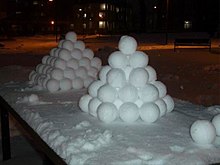Snowball
This article relies largely or entirely on a single source. (April 2015) |

A snowball is a spherical object made from snow, usually created by scooping snow with the hands, and compacting it into a roughly fist-sized ball. The snowball is often used to engage in games, such as snowball fights. Snowball fights are usually light-hearted and involve throwing snowballs at one's friends or family. The pressure exerted by the hands on the snow is a determinant for the final result. Reduced pressure leads to a light and soft snowball. Compacting humid or "packing" snow, by applying a high pressure produces a harder snowball or "iceball", which eventually can be considered harmful during a snowball fight.
A snowball may also be a large ball of snow formed by rolling a smaller snowball on a snow-covered surface. The smaller snowball grows by picking up additional snow as it rolls. The terms "snowball effect", "snowballing" and "Y Gasseg Eira" are named after this process. Often a snowman can be created using this method of snowballing, to create the sections needed to build the sculpture.
There are some temperature/humidity ranges that prohibit or restrict the formulation of a snowball. With a powdery snow, snowballs are difficult to form. In temperatures below 0 °C (32 °F), there is little free water in the snow, which leads to crumbly snowballs. At 0 °C (32 °F) or above, melted water in the snow results in a better cohesion. If a person is walking on snow and it squeaks, chances are the temperature/humidity level won't form a snowball, because squeaking means that the snow is dry.
Self rolling snowballs
Under certain, rarely occurring circumstances, self rolling snowballs form on their own. These circumstances are:
- The ground must have a top layer of ice. This will prevent the snowball from sticking to the ground.
- That ice has to have some wet and loose snow that is near its melting point.
- The wind has to be strong enough to push them. Yet, it cannot be too strong.
- Also, gravity could cause the snowballs to form instead of the wind.
Because these conditions have to take place at the right place in the right time, it is considered a phenomenon.[1]
Beach snow balls
Under other rare circumstances, waves action on ice floes may create beach snowballs.[2] This is the same mechanism that creates rounded boulders and pebbles on a beach.[3]
Gallery
 |
 |
 |
 |
See also
References
- ^ Rare self-rolling giant snow balls found in UK, The Telegraph, January 8, 2010
- ^ Emerson, Sarah (8 November 2016). "Thousands of Snowballs on This Siberian Beach Are Straight From a Fairy Tale". Motherboard. Vice Media. Retrieved 8 November 2016.
- ^ "The coolest beach in America: Hundreds of giant ice boulders weighing 75 POUNDS wash ashore in Michigan". Daily Mail. 28 February 2013. Retrieved 8 November 2016.
